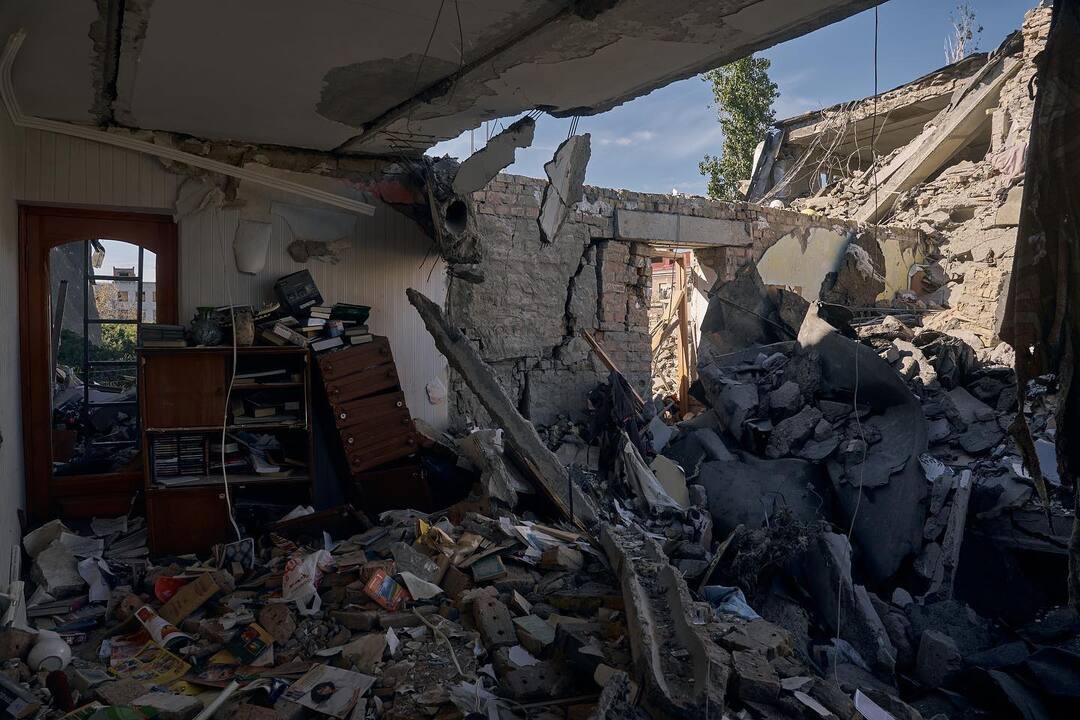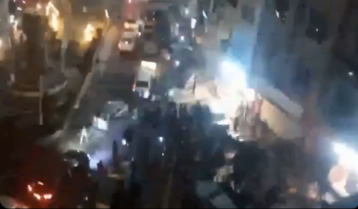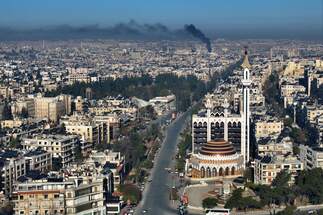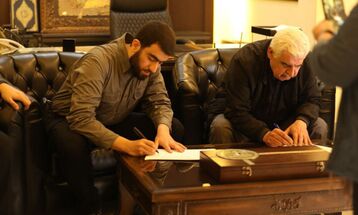-
NATO chief warns Russia not to 'use false pretexts' for escalation

NATO Secretary General Jens Stoltenberg has said that "Russia must not use false pretexts for further escalation" in the Ukraine conflict.
"Russia now falsely claims Ukraine is preparing to use a radiological 'dirty bomb' on its own territory," the NATO boss said from aboard the aircraft carrier USS George HW Bush on which he was a guest. "NATO allies reject this transparently false allegation."
"Russia often accuses others of what they intend to do themselves. We have seen this pattern before. From Syria to Ukraine," he added. "The world is watching closely."
Moscow had previously alleged that Ukraine was planning to detonate a radioactive "dirty bomb" in a bid to discredit Russia.
Ukraine has rejected Russia's allegations, along with France, the UK and the US.

The US aircraft carrier currently leads NATO's Neptune Strike 2022 exercise, according to the western alliance.
More than 80 aircraft, 14 ships and around 6,000 soldiers from NATO and partner countries are involved. Neptune Strike "tests our readiness to deter and defend across the Euro-Atlantic area," Stoltenberg asserted.
To get through winter season, Ukraine needs 4 billion euros
It is a bomb that contains radioactive material, such as uranium, which is scattered through the air when its conventional explosive detonates.
It doesn't need to contain highly refined radioactive material, as is used in a nuclear bomb. Instead, it could use radioactive materials from hospitals, nuclear power stations or research laboratories.
This makes them much cheaper and quicker to make than nuclear weapons. They can also be carried in the back of a vehicle, for example.
Because radioactive fallout can cause serious illnesses, such as cancer, such a bomb would cause panic among the targeted population.
US, UK, and France jointly reject Russia ‘dirty bomb’ claim
A wide area around the blast zone would also have to be evacuated for decontamination, or abandoned completely.
The Federation of American Scientists has calculated that if a bomb containing 9g (0.3oz) of cobalt-60 and 5kg of TNT were to be exploded at the tip of Manhattan, in New York, it would make the whole area of the city uninhabitable for decades.
For this reason, dirty bombs are known as weapons of mass disruption. However, as weapons, they are very unreliable.
For the radioactive material in a dirty bomb to be scattered across its target zone, it has to be reduced to powder form. But if the particles are too fine or released into strong winds, they will scatter too widely to do much harm.
You May Also Like
Popular Posts
Caricature
BENEFIT AGM approves 10%...
- March 27, 2025
BENEFIT, the Kingdom’s innovator and leading company in Fintech and electronic financial transactions service, held its Annual General Meeting (AGM) at the company’s headquarters in the Seef District.
During the meeting, shareholders approved all items listed on the agenda, including the ratification of the minutes of the previous AGM held on 26 March 2024. The session reviewed and approved the Board’s Annual Report on the company’s activities and financial performance for the fiscal year ended 31 December 2024, and the shareholders expressed their satisfaction with the company’s operational and financial results during the reporting period.
The meeting also reviewed the Independent External Auditor’s Report on the company’s consolidated financial statements for the year ended 31 December 2024. Subsequently, the shareholders approved the audited financial statements for the fiscal year. Based on the Board’s recommendation, the shareholders approved the distribution of a cash dividend equivalent to 10% of the paid-up share capital.
Furthermore, the shareholders endorsed the allocation of a total amount of BD 172,500 as remuneration to the members of the Board for the year ended 31 December 2024, subject to prior clearance by related authorities.
The extension of the current composition of the Board was approved, which includes ten members and one CBB observer, for a further six-month term, expiring in September 2025, pending no objection from the CBB.
The meeting reviewed and approved the Corporate Governance Report for 2024, which affirmed the company’s full compliance with the corporate governance directives issued by the CBB and other applicable regulatory frameworks. The AGM absolved the Board Members of liability for any of their actions during the year ending on 31st December 2024, in accordance with the Commercial Companies Law.
In alignment with regulatory requirements, the session approved the reappointment of Ernst & Young (EY) as the company’s External Auditors for the fiscal year 2025, covering both the parent company and its subsidiaries—Sinnad and Bahrain FinTech Bay. The Board was authorised to determine the external auditors’ professional fees, subject to approval from the CBB, and the meeting concluded with a discussion of any additional issues as per Article (207) of the Commercial Companies Law.
Speaking on the company’s performance, Mr. Mohamed Al Bastaki, Chairman BENEFIT , stated: “In terms of the financial results for 2024, I am pleased to say that the year gone by has also been proved to be a success in delivering tangible results. Growth rate for 2024 was 19 per cent. Revenue for the year was BD 17 M (US$ 45.3 Million) and net profit was 2 Million ($ 5.3 Million).
Mr. Al Bastaki also announced that the Board had formally adopted a new three-year strategic roadmap to commence in 2025. The strategy encompasses a phased international expansion, optimisation of internal operations, enhanced revenue diversification, long-term sustainability initiatives, and the advancement of innovation and digital transformation initiatives across all service lines.
“I extend my sincere appreciation to the CBB for its continued support of BENEFIT and its pivotal role in fostering a stable and progressive regulatory environment for the Kingdom’s banking and financial sector—an environment that has significantly reinforced Bahrain’s standing as a leading financial hub in the region,” said Mr. Al Bastaki. “I would also like to thank our partner banks and valued customers for their trust, and our shareholders for their ongoing encouragement. The achievements of 2024 set a strong precedent, and I am confident they will serve as a foundation for yet another successful and impactful year ahead.”
Chief Executive of BENEFIT; Mr. Abdulwahed AlJanahi commented, “The year 2024 represented another pivotal chapter in BENEFIT ’s evolution. We achieved substantial progress in advancing our digital strategy across multiple sectors, while reinforcing our long-term commitment to the development of Bahrain’s financial services and payments landscape. Throughout the year, we remained firmly aligned with our objective of delivering measurable value to our shareholders, strategic partners, and customers. At the same time, we continued to play an active role in enabling Bahrain’s digital economy by introducing innovative solutions and service enhancements that directly address market needs and future opportunities.”
Mr. AlJanahi affirmed that BENEFIT has successfully developed a robust and well-integrated payment network that connects individuals and businesses across Bahrain, accelerating the adoption of emerging technologies in the banking and financial services sector and reinforcing Bahrain’s position as a growing fintech hub, and added, “Our achievements of the past year reflect a long-term vision to establish a resilient electronic payment infrastructure that supports the Kingdom’s digital economy. Key developments in 2024 included the implementation of central authentication for open banking via BENEFIT Pay”
Mr. AlJanahi concluded by thanking the Board for its strategic direction, the company’s staff for their continued dedication, and the Central Bank of Bahrain, member banks, and shareholders for their valuable partnership and confidence in the company’s long-term vision.
opinion
Report
ads
Newsletter
Subscribe to our mailing list to get the new updates!






















